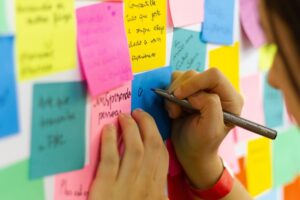Progress as a teacher
Teachers improve throughout their careers, but the most dramatic gains occur during their first three years in the classroom. Their subsequent earnings depend on how teachers invest in continuing education or independent learning to develop their professional skills.
Teachers’ progress in developing their expertise will depend on how professional learning is combined with deliberate practice. Other important factors are linked to educational leadership, quality support (pedagogical coaching) and participation in professional learning communities (peer learning, lesson studies, etc.).
Maintaining fervor and motivation in improving one’s skills will depend on the ability of teachers to ask questions, and on the opportunities offered to them to renew themselves. These opportunities also depend on their desire to seize them, to continue to discover and train, and the desire to start again each year with a fresh perspective.
What can we say about a teacher who engages in a process of improving his practices?
Many factors can hinder the development of teacher expertise. Program objectives can sometimes be unclear. The missions of education can sometimes have undefined contours and different interpretations depending on the specific sensitivities, the culture of the establishments and the preferred educational paths.
The level of success and learning of students when choosing certain approaches can be difficult to measure, even if only to estimate. It is not always easy to distinguish between what is anecdotal and what is representative when we consider the impact of our own practices. A certain romantic idealism can sometimes detach us from certain decision-making or concrete and pragmatic paths.
It is indeed complex and difficult to identify the manifestation of effective learning in a classroom. Each teacher informed by his own experience does not have the necessary perspective and cannot escape his cognitive biases. The disconnection of many teachers from research contributions can lead to a situation where they do not have access to certain validated and yet valuable reference models linked to effective practices.
Many subjective factors can also serve as pretexts or foils. It’s about identifying and flushing out the false culprits. A teacher can satisfy himself by telling himself that he is doing his best and that no one is required to do the impossible. He can honestly believe that his students are unfortunately not working as much as they should despite all his efforts, his advice or his injunctions.
A teacher may say he is constrained and powerless in the face of certain limiting factors over which he seems to have no control, without realizing that his point of view may also be biased. These factors potentially invoked by teachers:
Improvement is only possible thanks to a certain visibility and transparency of the processes at work. It begins to be possible under two conditions. First, we are clear about what we want our students to learn. We clearly define how we are going to proceed from an educational point of view to teach them. Likewise, we must enable ourselves to verify what they are actually learning. We must act and guide our teaching based on the feedback we collect.
The process of improvement is initially a form of humility. We humbly recognize our fallible character, this testifies that our actions are undoubtedly perfectible. We can then agree to question ourselves and make the effort towards desirable changes.
A key principle of the teacher’s expertise and professionalism corresponds to systematically keeping in sight the desire to improve through maintained attention, in line of sight, towards different indicators.
Concretely, through our classroom experiences, the idea would be that we constantly seek to support and identify the learning progress of our students. Depending on their evolution, we adapt in a relevant manner, informing ourselves of the contributions of research.
This ability to monitor each of our students in terms of their learning is ideal, but complex to implement. The main advantage of favoring it if our resources allow it is that it gives us the necessary perspective to no longer think about anything other than the simple design of our courses. We can also focus on efficiency and improving our practices.
Train skills through learning knowledge
There is a risk linked to the use of teaching and evaluation approaches which are based purely on the establishment of skills. When the latter are presented as general before being specific, the underlying knowledge content is then not clearly defined. Detailing it and covering it accurately is not or is no longer a priority.
Developing skills and evaluating students in their ability to solve complex tasks and problems is legitimate and desirable to the extent that the knowledge and skills involved are precisely specified and taught beforehand.












Post Comment
You must be logged in to post a comment.